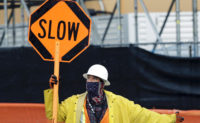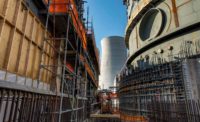This spring, Hoar Construction has found itself on both sides of the face-covering challenge.
As guidance on virus protections for workers evolved during the spring, contractors in many parts of the U.S. chose or were compelled by state or local rules or unions to go beyond federal guidance and require workers to use a face covering of some kind on the jobsite.
In other areas the face coverings were recommended but not required.
[For ENR’s latest coverage of the impacts of the COVID-19 pandemic, click here]
Hoar, a major Birmingham-based contractor, has found itself working across the south and southwest under different local rules. At two of its jobsites where masks were not required, significant numbers of workers tested positive for the virus.
But at one of those jobsites, wearing a face covering remains an individual worker's decision—even though Hoar strongly recommends it.
These two jobsites are a microcosm of the broader and continually evolving debate in the U.S. over the necessity and benefit of face coverings.
Dozens Test Positive
The pandemic related issues have been a concern for Hoar since at least March. President Tim Burton told a Construction Superintendent publication that month that his company was staying abreast of CDC recommendations for social distancing and hygiene.
Hoar was constructing a new Charlotte apartment tower, called Market 42, for a subsidiary of Lennar, the big homebuilding company. The complex includes 549 apartments in separate sections: a mid-rise structure that Lennar is building on its own and a 33-story high-rise building that Hoar is constructing.
In the week leading up to June 1, Hoar informed local officials in Charlotte, N.C., that dozens of workers on the high-rise apartment building had tested positive for coronavirus. The contractor shut down work for several days to decontaminate the jobsite, and made face coverings mandatory as work resumed.
As work restarted, face coverings remain strongly recommended but optional. Another safety issue also had to be considered: heat.
Of the 300 workers employed by Hoar and its subcontractors on that project, 38 tested positive.
"There's no way for any one to know where they acquired" the virus, Randall Curtis, Hoar chief operating officer, said in early June.
Prior to the Charlotte shutdown, Hoar said it followed CDC and OSHA guidelines on social distancing and proper hygiene, including prescreening, handwashing, staggered start times for trade partners, increased cleanings, social distancing markers and limited bucket hoist occupancy.
Once it learned of the positive cases in Charlotte, employees were contacted, contact tracing started and notifications were sent out.
The company said it then started enhanced prescreening, and "while the CDC and City of Charlotte do not require the use of face coverings," and "up until now, we recommended the use of face coverings," Hoar is "now mandating face coverings for all employees on the jobsite."
"Considering the spike, we thought it prudent," said Curtis.
Just as the Charlotte project shut down, Hoar informed local officials in Texas that dozens of workers had tested positive on an HVAC renovation project on the Texas A&M University campus in College Station. Hoar then suspended work on that roughly $13-million HVAC reconstruction, in a building called Dunn Hall, for a week.
Of 155 workers tested on the college project, 55 tested positive. Only six had symptoms. Eight more tests are pending.
As work restarted, however, face coverings remain strongly recommended but optional. Another safety issue also had to be considered: heat.
With daytime temperatures in College Station exceeding 90° F and little opportunity to ventilate or cool the space during work where HVAC duct is being replaced, Hoar is keeping use of face coverings voluntary.
"The work is basically being done inside a box" where the heat is also a safety concern, said Curtis. And "honestly, the last thing we want is to have a policy and not be able to enforce it."
Hot-Button Issue
The months from March to June have been unlike any others this generation of construction workers has ever seen. Numerous employers initiated temperature tests and health questions at project gates. Decontamination of surfaces became a necessary obsession.
"Early in the U.S. pandemic, construction employers were encouraged to donate N-95 respirators to health care workers who didn't have enough.
Over the months the importance of face coverings, following new research about the spread of the virus, gradually increased.
But as weariness with stay-at-home rules and the economic cost of the pandemic grew, indifference or disregard for face coverings became a charged cultural and political matter.
President Trump made himself a symbol of the anti-face covering sentiment by refusing to wear one numerous times in public meetings, contradicting the health advice of his own administration.
Face coverings remain a hot-button issue in the general public. California on June 17 announced that all individuals in both indoor and outdoor public spaces would be required to wear them.
As early as April some national contractors, a handful of top contractors and energy companies made face coverings mandatory at many jobsites. Despite the discomfort and inconvenience that wearing the coverings imposed on workers, other companies based the decision partly on the difficulty of maintaining strict social distancing.
Early in the U.S. pandemic, construction employers were encouraged to donate N-95 respirators to health care workers who didn't have enough. But as work continued at many construction project, OSHA and CDC guidance indicated that while surface contamination may lead to infection, most virus spread was from face-to-face interaction. At the same time, the federal guidance on limiting the spread of virus via airborne droplets gradually expanded to include the suitability of cloth face coverings, in order to limit the spread of droplets in tandem with social distancing.






Post a comment to this article
Report Abusive Comment